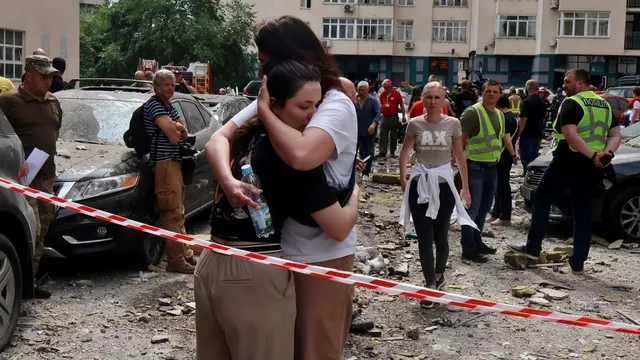
Pope Leo XIV and JD Vance unite for Ukraine ceasefire talks
2025-05-19 06:45- Pope Leo XIV met with U.S. Vice President JD Vance to discuss diplomatic efforts for a ceasefire in Ukraine.
- The Vatican has offered to host peace talks and is involved in humanitarian efforts relating to the conflict.
- This meeting reflects a growing recognition that addressing climate change and humanitarian issues is crucial in global security discussions.
Express your sentiment!
Insights
In the wake of ongoing conflict in Ukraine, Pope Leo XIV, elected as the first American pope, convened a meeting with U.S. Vice President JD Vance at the Vatican. This meeting took place shortly after Vance arrived in Vatican City early on Monday, May 19, 2025, as part of a U.S. delegation aimed at advancing diplomatic efforts for a ceasefire agreement in the war between Russia and Ukraine. The U.S. government, under President Donald Trump, has been engaged in intensive diplomacy to facilitate peace talks and humanitarian assistance, particularly concerning issues like prisoner swaps and the protection of displaced Ukrainian children. During Vance's visit, he engaged separately with significant leaders, including Ukrainian President Volodymyr Zelenskyy and EU Commission President Ursula von der Leyen, emphasizing the urgency of reaching a resolution in the ongoing situation. The Vatican, traditionally a participant in peace discussions, has actively offered to mediate peace talks amidst the conflict, a role it had not emphasized in earlier stages of the war, where it had been sidelined for about three years. The Pope has committed to do everything within his power to advance peace efforts, reflecting values consistent with his predecessor Pope Francis's focus on migration and humanitarian issues, thus indicating a moral imperative in addressing the plight of suffering populations. The discussions come against a backdrop of global concerns regarding climate change and its intersection with geopolitical strife, as highlighted in a recent panel that examined the ongoing war as a product of fossil fuel interests, consolidating the argument for a shift in security paradigms towards addressing ecological and humanitarian needs. Experts have suggested that the war in Ukraine has significant environmental consequences as well, drawing attention to the need for comprehensive peace-building efforts that consider ecological integrity as central to global security. Overall, the meeting signifies a collaborative effort between U.S. political leadership and the Vatican in navigating the complexities of the war, with hopes for a renewed commitment toward peaceful resolutions and support for the humanitarian crisis resulting from the ongoing hostilities, marking a crucial moment in international diplomatic efforts for stability in the region.
Contexts
The current status of Ukraine ceasefire negotiations is characterized by a complex interplay of diplomatic efforts and the ongoing security situation in the region. As of May 19, 2025, various international entities, including the United Nations and the Organization for Security and Co-operation in Europe (OSCE), have been pivotal in facilitating dialogue between the conflicting parties. These negotiations have been influenced by recent developments on the ground, including sporadic outbreaks of violence and shifts in military positioning that have complicated the prospects for a lasting ceasefire. Engaging key stakeholders within the Ukrainian government and the separatist regions remains a critical component of these talks, with emphasis on establishing trust and verifying adherence to any agreements reached. Negotiators are working towards frameworks that address the underlying issues leading to conflict, such as political autonomy for the separatist regions, security guarantees, and the return of displaced populations. Humanitarian access to affected regions is also a central focus of negotiations as the humanitarian crisis continues to escalate, with many civilians facing dire conditions. The role of external actors, particularly Russia, and Western nations remains a contentious topic. Diplomatic maneuvers by these powers can either facilitate or hinder the progress of negotiations depending on their interests and influence in the region. In recent months, there have been various rounds of talks aimed at securing a comprehensive agreement. While progress has been made in some areas, including informal ceasefires during humanitarian aid deliveries, a formal, sustainable ceasefire remains elusive. Factors such as local grievances, distrust among parties, and external pressures continue to be significant obstacles. The international community remains vigilant, emphasizing the need for adherence to principles of sovereignty and territorial integrity while also advocating for peaceful resolution through dialogue. As this situation is fluid, ongoing monitoring and engagement by international bodies and regional powers will be essential in shaping the future of ceasefire negotiations. Continued support for diplomatic efforts is crucial, as is the necessity for transparency and accountability in any agreements made to ensure they are open to scrutiny and align with the hopes of the Ukrainian populace for peace and stability. The path ahead is fraught with challenges, but sustained commitment from all parties involved may eventually yield a framework for peace.